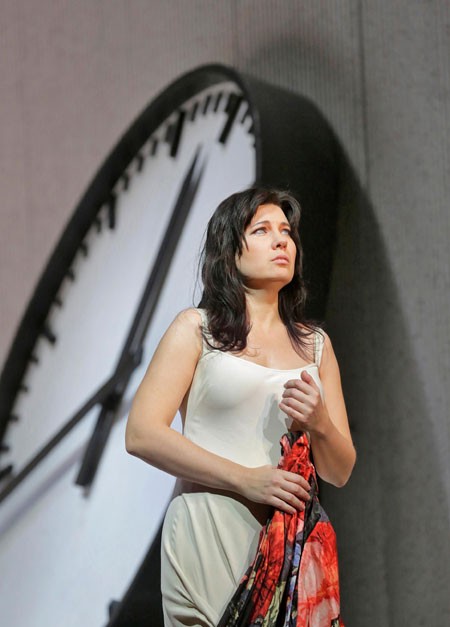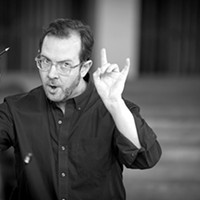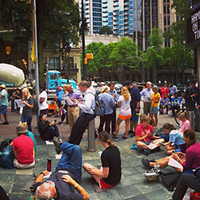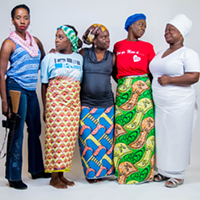Part 2: New York City reviews
Shows from Metropolitan Opera, Lincoln Center, more
By Perry TannenbaumIf you're plugged in to the national arts scene, you've read all about it: the Met's GM Peter Gelb wrangling with unions before the season started, pleas to singers to reduce their fees, angry demonstrations against The Death of Klinghoffer, and protests directed against pro-Putin superstars Valéry Gergiev and Anna Netrebko. This year, the Metropolitan Opera is an opera — occasionally a sudsy one.
You can argue about the Met's pre-eminence on the national cultural scene. You can even debate whether the Met is top gun in the Big Apple. But as the current season reaffirms, nobody can challenge The Met's claim to the title of prima donna among American arts organizations. I can't think of any company that comes close.
We thought we'd escape the Gelb-Klinghoffer-Gergiev drama by simply concentrating on a trio of uncontroversial Met productions on three successive Tuesday nights. And we succeeded until Act 3 of The Merry Widow, when the curtain suddenly descended in the middle of a huge and naughty can-can number, due to technical problems. Not a merry prospect, even if you waited out the half-hour delay before the performance resumed.
Met diva Renée Fleming and five-time Tony Award nominee Kelli O'Hara graciously lingered through the dramatic pause. My mom and I, on the other hand, departed after the second curtain announcement. We had a 10:30 Access-A-Ride rendezvous out on Lincoln Center Plaza, the temperature had already dipped to 19°, and Mom had already overcome pneumonia once this season.
Aside from that one lapse — less than 15 minutes from the end of the operetta — here's what I saw at Lincoln Center this winter and how I saw it:
La Traviata (***3/4) — Four years ago, when the new Met production of Verdi's tenderest love story opened during a less stormy season, Willy Decker's modernized concept caused a stir. Beyond the modern dress — unisex tuxes for the chorus in the opening scene! — Decker called for a single colorless set to cover the action in a notorious Parisian courtesan's salon, later at her bucolic country retreat, and finally at her deathbed.
Toward the right side of the set, best described as a curving wall of gray panels, scenic and costume designer Wolfgang Gussman placed his most surreal touch: a huge clock that ticks down the tubercular Violetta's remaining days. Now a set like this wouldn't have caused an uproar at Spoleto Festival USA, where spare symbolic versions of modern, Romantic, and even Baroque operas had been presented for decades. Nor were there convulsions at the Salzburg Festival in 2005 when Decker's Traviata originally premiered.
But this was the Met, and Traviata was just the second Peter Gelb venture into shaking up production values under his regime, after a much-despised overhaul of Tosca (**3/4) the previous season. By scaling down the spectacle, both these new productions put an added burden on the vocalists to fill in the missing colors. Meanwhile, Decker seems to have doubled down on the symbolism. Doctor Grenvil, who doesn't normally appear until the final act, becomes a lurking presence from the beginning, an Angel of Death until his human identity crystalizes.
With Marina Rebeka as the frail, wanton, and good-hearted courtesan, Decker and conductor Marco Armiliato have found a near-perfect Violetta. For the first few minutes, I thought we'd be condemned to an underpowered evening from the soprano. Nor did the uniformity of the costumes help in establishing the rivalry between Violetta's two chief admirers, the elder Baron Dauphol and hot young spark Alfredo Germont, who is introduced to her at the opening soiree.
Once Alfredo, ardently sung by tenor Francesco Demuro, was prevailed upon to sing his famed "Libiamo!" toast, Rebeka was sufficiently warmed up for a ringing response. We heard how lustily and purely she could fill the hall with her voice, and when she came to her meditative "Ah, fors'è lui" shortly afterwards, we heard how poignantly she could melt in her pianissimos. By the time the curtain fell on the closing Rebeka-Demuro duet in Act 1, it was clear that this might be a Traviata to treasure.
With baritone Quinn Kelsey's arrival in Act 2 as Giorgio, Alfredo's overprotective yet sensitive father, there could be no further doubts.
The Nielsen Project at the NY Philharmonic (***1/2) — We looked in on the Phil at the beginning of Alan Gilbert's tenure as music director in 2009, so I thought it was about time to peep in again as the orchestra wrapped up their ongoing Nielsen Project with the Danish composer's Clarinet Concerto. Turns out that I was at Avery Fisher Hall watching Gilbert about four weeks before he made a headline of his own, announcing that he would be stepping down as director in 2017. Whoever replaces him will preside over a two-season exile beginning in 2019 while Avery Fisher undergoes an extensive makeover.
Gilbert was already adventurous in his programming — and marketing — when I first saw him, mixing the challenging Anton Webern with familiar Mozart and Schumann repertoire, then repackaging all the NY Phil concerts on iTunes. This time around, the Nielsen was sandwiched between Ravel's Valses nobles et sentimentales and selections from Tchaikovsky's Swan Lake. Out in the lobby, Gilbert signed copies of the newest CD in the Nielsen series after promising, in his program notes, to round out the recording component of the Project by June, in time for Carl Nielsen's 150th birthday.
The maestro continues to spurn those perfunctory overture-length confections to kick off programs that simply warm up the players, serve as vaguely familiar appetizers for the groundlings, and coddle the latecomers. Ravel's suite was more to my liking, about 18 minutes long when recorded by the Phil in 1990, with an interesting variety of moods and tempos in its eight exquisite miniatures. There were piquant blends for the string section and the winds, lovely solo passages for the flute and oboe, Debussy-like swells and laments, and the kind of dancing percussive joyfulness we expect from Ravel.
Stepping up to play the rather demanding concerto was the Phil's principal clarinetist, Anthony McGill. Getting this kind of opportunity may not have been the primary reason why McGill moved across Lincoln Plaza from the Met Opera Orchestra to the Phil – up from the pit and into the spotlight – but he surely excelled. The piece sounds as wild as it did in 1928, and more than any of the three recordings I own of the work, McGill consistently gave me the impression that he was arguing with himself, whether his cadenzas were lyrically soaring and soothing or furiously writhing, squonking, and squealing. The orchestra was superb behind him, especially the snare drum, keeping the mood swings coherent.
Recalling the wonders Tchaikovsky performs each Yule in Nutcracker with his woodwinds, individually and collectively, I continued worrying over the oncoming Swan Lake excerpts after intermission. Section work sounded tubby and ungainly in my previous visit to Avery Fisher, but whatever adjustments have been made — either acoustically at the hall or in how the winds are prepped as an ensemble — they completely dispelled my fears.
While oboist Liang Wang played the great Swan Lake theme with one more breath than I would have preferred, his articulation and liquid tone were perfection, and the powerful orchestral response was thrilling, then achingly ardent before reaching a nearly deafening climax. Gilbert's selection of episodes was beautifully judged, allowing many of his principals to shine. Concertmaster Sheryl Staples was particularly scintillating in two cadenzas, outdoing herself in the "Russian Dance" with double-bowing, pianissimo trills, harmonics, and glisses — at an increasingly frantic pace.
Die Meistersinger von Nürnberg (***1/2) — James Morris had already been singing at the Met for 30 years when I first saw him as Hans Sachs in a Live at Lincoln Center TV broadcast in 2001 with James Levine conducting and co-stars that included Ben Heppner, Karita Mattila, and René Pape. So it was with a mixture of warm nostalgia and trepidation that I went to see the sturdy baritone once again as the sagely Nuremberg shoemaker-poet in the last performance of the Otto Schenk production with its wondrous Gunther Schneider-Sienssen set designs.
James Levine conducted the Schenk production when it premiered in 1993, and he would be back in the pit to see it off. The real question was whether Morris, less than three weeks shy of his 68th birthday, could still carry one of Wagner's epic creations. It would have been a long dreary evening if he couldn't — 266 minutes long, plus two intermissions.
But Morris was nothing short of amazing in his valedictory, which made the autumnal colorings of the comedy-drama overwhelmingly moving. Sachs is the go-to guy for the knight-hero of the story, Walther von Stalzing, when he discovers that neither wealth nor valor will win his heart's desire, Eva. Her father, venerable goldsmith Veit Pogner, decrees that Eva's hand will go to the winner of the city's annual mastersinger competition.
Walther's chief competitor will be town clerk Sixtus Beckmesser, already the most pedantic member of the mastersinger guild, which will judge the contest — unless Sachs, who has loved Eva all of her life, decides to compete. Eva is slightly torn between Walther and Sachs. She knows and loves Sachs that way all of Nuremberg does, but she's smitten by Walther.
So all the discernment, empathy, and poignant self-awareness of Sachs are on display at the start of Act 3, when the poet sees he's too old for Eva, leaving the field open for Walther and cleverly plotting to assure the knight of a decisive victory. Just to watch Morris leaning on one of the pillars of his workshop, his Whitman-like slouch and grin perfectly expressing his good-hearted stoicism, moved me to tears — especially since the voice hadn't even begun to falter.
Older and in his twilight, Morris was more ideally cast as Sachs than ever, and Johannes Martin Kränzle was a terrific foil as the repellant Beckmesser, capping his comedic exploits in the final scene with triple exclamation points as he mangled the same song that would bring victory to Walther. No more delectable than the hefty Heppner, Johan Bothan always had a noble bearing as Walther, and his tenor had an ethereality that was perfect for his poetic temper.
Ultimately, Meistersinger is a celebration of music as much as it is a triumph of loving hearts — and a meaningful meditation on what goes into great art. Four years before Wagner's countryman Friedrich Nietzsche propounded his ideas about the Dionysian and the Apollonian principles in The Birth of Tragedy, the composer put forth similar counterweights in Walther and Hans Sachs and set about demonstrating that the highest art is a synthesis of both their merits, Walther's inspiration and Sachs' craftsmanship. When the underlying theme of a comedy is that profound, you can profit from spending six hours with it.
The Merry Widow (**1/2) — Only at an Opera Carolina production of The Mikado, way back in 1994, have I been so crushingly bored by an operatic performance. My mom, who began going to the Met over 70 years ago, told me she had never seen a mass exodus from the hall like the one we saw after the curtain came down near the end of Franz Lahár's effervescent trinket.
This operetta had none of the fizz and sparkle we saw last season from Die Fledermaus, a far worthier bagatelle. Flattest of all was the design concept, with strangely claustrophobic, nondescript set designs by Julian Crouch that never seemed to allow the action to spring off the stage and into the hall. None of Tony Award winner William Ivey Long's costume designs helped the cause, and Susan Stroman, despite the Tony Awards on her mantelpiece for both directing and choreography, couldn't coax much spark out of the performers until we reached that can-can climax, when it was too late.
Fleming sang beautifully in the title role, her signature creaminess on "Vilja" reaffirming that the soprano is not far past her prime. That highlight just after intermission roused my hopes that a fraction of the care she lavishes on floating her exquisite high notes might now be bestowed upon the character of Hanna Glawari. Didn't happen. Except for that song, Fleming was never much more than the woman in the most elegant Ivey Long dresses — a result that doesn't augur well for the diva's upcoming Broadway debut in Living on Love this April.
With her inherited fortune, Hanna is supposed to loom as the financial salvation of Pontevedro. So there ought to be more to her as a marital catch than her bank account and her fashionable wardrobe, especially if Pontevedro's most eligible — and virtuous — bachelor, Count Danilo, is to retain a healthy interest. Fleming seemed to think her cover girl face was sufficient blandishment on the basics, but in a house as large as the Met, it wasn't, no matter how well she has managed to keep the bloom on that rose.
As Count Danilo, baritone Nathan Gunn never seemed any more excited or conflicted about Hanna than I was. Nor did the cuckold of the piece, Sir Thomas Allen as the Baron Zeta, succeed in delivering a single comical moment. That made it a little more difficult for the celebrated O'Hara to get a foothold in her Met debut as Valencienne, the baron's wanton and duplicitous wife. She acquitted herself well enough vocally in her Act 3 showcase, and she was the only principal who really benefited from Stroman's choreographic pizzazz.
In their transitions from Broadway to New York's fabled opera house, Stroman's debut was more stumbling than O'Hara's. Both are works-in-progress, and I can only hope they'll latch onto projects that will tap more aptly on their potential.
Latest in Performing Arts
More by Perry Tannenbaum
Calendar
-
An Evening With Phil Rosenthal Of "Somebody Feed Phil" @ Knight Theater
-
Kountry Wayne: The King Of Hearts Tour @ Ovens Auditorium
-

NEW WINDOW GALLERY-Pat Rhea-ACRYLIC PAINTINGS-April 05-30 2024 VALDESE, NC 28690 @ New Window Gallery/Play It Again Records
- Through April 30, 12 p.m.
-

Trap & Paint + Karaoke @ Zodiac Bar & Grill
-

LIVE MUSIC FRIDAYS!!! @ Elizabeth Parlour Room

















